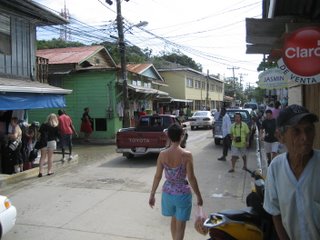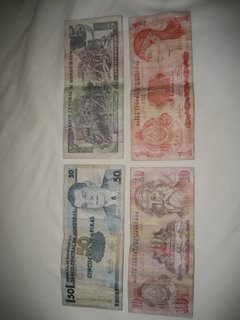 There in the distance are the mountains of the mainland coast of Honduras, Central America. The Veendam has never stopped here before, it being a fairly new cruise port. And indeed, the Costa Meditteranea is the only other ship with us in port.
There in the distance are the mountains of the mainland coast of Honduras, Central America. The Veendam has never stopped here before, it being a fairly new cruise port. And indeed, the Costa Meditteranea is the only other ship with us in port.Still, when my tender pulls up to the dock, it’s clear to see why this place is so rarely visited. There’s not much here more than impoverished beggars trying to sell whatever they can to thrill-seeking tourists just to get by. I am no more than 10 feet up the pier when a group of locals in their best semblance of uniformed costumes performs a cultural dance with the equivalent of a jugband of musicians, and a bowl on the ground before them labeled “tips.” As I continue down the pier to the port, there is a similar setup for a three-man marimba, and a large billboard with handwritten paint listing “cheap” excursions dressed up with fancy names.
 Finally reaching the town, there is nothing more than a rambling street lined with shack after shack, each family scattered around tables in their front yards which are covered in handcrafted jewelry made of seashells, fish scales, semi-precious mineral rocks, and fishing line; wooden plates crudely hand-painted with depictions of Honduras’ symbols; postcards, clothing, and anything else that might open a tourist’s wallet. Even the children are so bold as to walk right up to you, hold out their grubby hands and say in English, “Give me a dollar.”
Finally reaching the town, there is nothing more than a rambling street lined with shack after shack, each family scattered around tables in their front yards which are covered in handcrafted jewelry made of seashells, fish scales, semi-precious mineral rocks, and fishing line; wooden plates crudely hand-painted with depictions of Honduras’ symbols; postcards, clothing, and anything else that might open a tourist’s wallet. Even the children are so bold as to walk right up to you, hold out their grubby hands and say in English, “Give me a dollar.”Bicyclists with buggy carts offer to take you anywhere on the island for just a dollar. An old thinly-bearded man with his few remaining teeth yellowed and hanging crooked from his gums sings slurring lyrics while strumming his tattered guitar and once in a while he holds out his hand to the passing crowd, since there is no guitar case to lay open, nor a place to set it beside him on the busy sidewalk.
 Finally, I stopped into a convenience store that had a Coke sign on its door. Inside, the floor is well-trampled dirt, the plywood shelves are strewn with dusty stockpiles of everything from laundry detergent to baby formula, and the entire place reeks of the mangy hounds that probably “safeguard” the place at night. One lonely Coca-cola cooler stands in a corner, from which I pull two Coke Lights (the C.A. version of Coke Zero). I pay with a five dollar bill and receive 66 Limpiras in return. The cokes cost me about $1.50 US. The exchange rate is £18.8 to $1 US. When I asked the clerk about the people whose faces are depicted on the bills, he can only tell me that each one was a “national hero” of some kind. (I am ashamed to say that most Americans can’t do much better with our own bills.) But he is impressed with my language fluency.
Finally, I stopped into a convenience store that had a Coke sign on its door. Inside, the floor is well-trampled dirt, the plywood shelves are strewn with dusty stockpiles of everything from laundry detergent to baby formula, and the entire place reeks of the mangy hounds that probably “safeguard” the place at night. One lonely Coca-cola cooler stands in a corner, from which I pull two Coke Lights (the C.A. version of Coke Zero). I pay with a five dollar bill and receive 66 Limpiras in return. The cokes cost me about $1.50 US. The exchange rate is £18.8 to $1 US. When I asked the clerk about the people whose faces are depicted on the bills, he can only tell me that each one was a “national hero” of some kind. (I am ashamed to say that most Americans can’t do much better with our own bills.) But he is impressed with my language fluency.An hour and a half later, thoroughly unimpressed but nonetheless moved, I returned to the ship. Here, where the passengers have paid upwards of $1500 just for the privilege of cruising, many of whom are on their sixth or seventh cruise, who aren’t afraid to throw out $2 for a can of soda or $7 for a cocktail, I wonder how many of them saw what I saw today, in the same way I saw it, and how many took one look out their porthole-windows and just didn’t bother to get out. When the crew gathers around at dinnertime, and everyone asks, “So, did you go out today?” the all-around response is chorused, “Yeah,” with a bit of reflective pity. Some of us are grateful to be Americans. But we know that many of this crew just got a glimpse of home today.

No comments:
Post a Comment